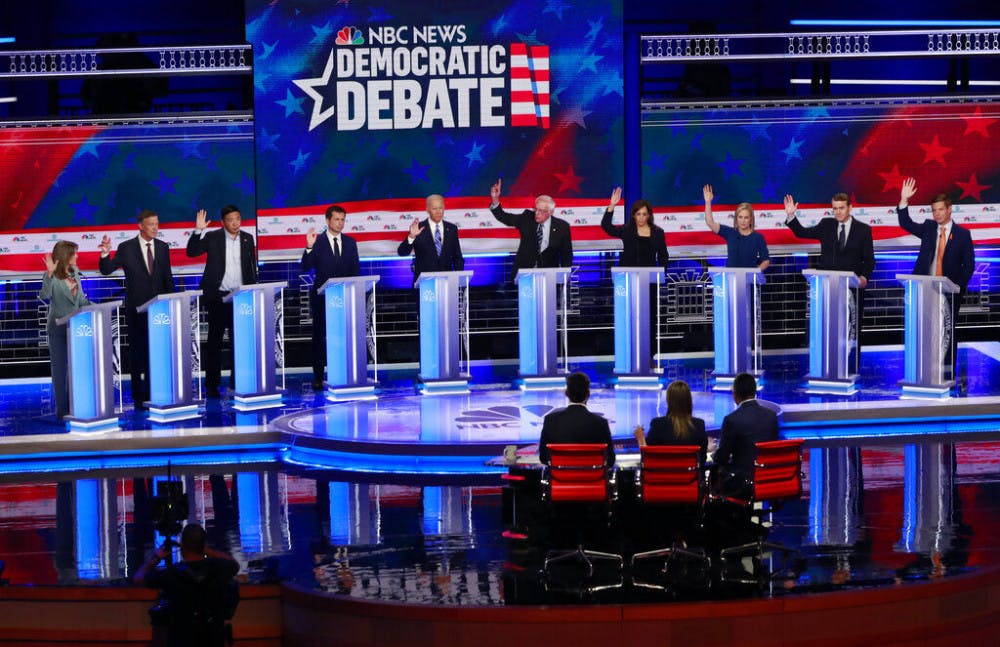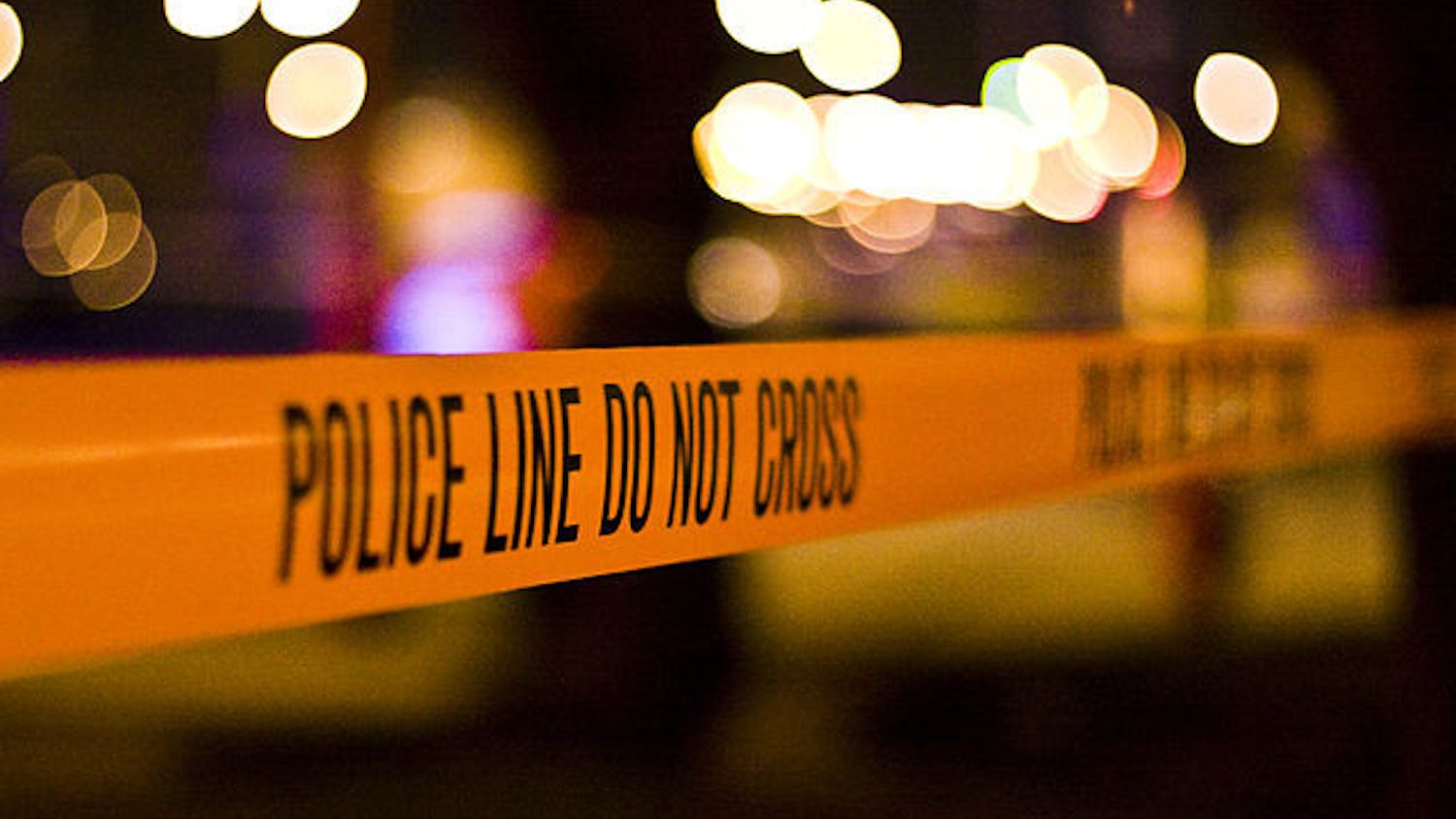The first Democratic presidential debate concluded Thursday night with 10 more candidates taking the Miami stage. Many of the issues discussed were similar to Wednesday night’s, such as gun control, healthcare and immigration. However, hostility was higher on the second night with former Vice President Joe Biden and 2016 presidential candidate Bernie Sanders on stage.
The Thursday candidates were Colorado Sen. Michael Bennet, Biden, South Bend, Indiana, Mayor Pete Buttigieg, New York Sen. Kirsten Gillibrand, California Sen. Kamala Harris, former Colorado Gov. John Hickenlooper, Vermont Sen. Sanders, California Rep. Eric Swalwell, author Marianne Williamson and entrepreneur Andrew Yang.
Thursday night featured three women onstage: Williamson, Harris and Gillibrand; one African American candidate: Harris, one openly gay candidate: Buttigieg; one Asian American candidate: Yang; and eight white candidates: Biden, Sanders, Buttigieg, Bennet, Gillibrand, Hickenlooper, Swalwell and Williamson.
Discussing race
Race was discussed multiple times during Thursday’s debate. Moderator and MSNBC host Rachel Maddow first broached the subject at the start of the second half of the debate with a question for Buttigieg. His mayoral community, South Bend, Indiana, had an officer-involved shooting of a black man on June 16.
Buttigieg was asked why the percentage of black police officers did not increase during his time as mayor. The South Bend police force is 6 percent black, while the city’s population is 26 percent black. He simply admitted he could not get it done.
Buttigieg admitted that he could not increase the percentage of black officers in the police force in South Bend during his two terms as mayor, despite the importance with the black community. South Bend is mourning a recent officer-involved shooting.
— April Rubin (@AprilMRubin) June 28, 2019
The conversation continued when Williamson discussed the deep historical roots of racial injustice. After Williamson brought up slavery reparations, Harris interjected, as the only black person on the stage, to share her personal experience with racism and call out Biden’s statements and stances.
Williamson says that issues such as these are deeply rooted in American race problems and that the Democratic Party should be focused on reparations. Harris said that she, as a black candidate, would like to speak on the subject of race.
— April Rubin (@AprilMRubin) June 28, 2019
Harris got a large applause after directing a statement to Biden. She said she does not believe he is racist, but questioned his statements about two racist US senators. “There are moments in history when states fail to support the civil rights of our people,” she said.
— April Rubin (@AprilMRubin) June 28, 2019
Bringing up Biden’s past
The former Vice President was under scrutiny throughout the debate for his political history. As part of the race discussion, Harris brought up Biden’s recent statements about two segregationist senators he worked with.
“It was hurtful to hear you talk about the reputations of two United States senators who built their reputations and career on the segregation of race in this country,” Harris said. “And it was not only that, but you also worked with them to oppose busing.”
She also spoke about how his opposition to busing affected her directly. He responded he did not praise racists, his career has always been focused on supporting civil rights and she misconstrued his stance on busing because he only opposed federal busing. Harris replied the federal government should step in when states fail to support civil rights.
Harris got a large applause after directing a statement to Biden. She said she does not believe he is racist, but questioned his statements about two racist US senators. “There are moments in history when states fail to support the civil rights of our people,” she said.
— April Rubin (@AprilMRubin) June 28, 2019
Swalwell also confronted Biden, specifically for his age, by telling him it was time to “pass the torch to a new generation of Americans” — quoting Biden’s speech at the 1988 Democratic convention, during his first presidential campaign 32 years ago. Passing the torch is necessary to solve automation issues, climate chaos, student loan debt and gun violence, Swalwell said.
“I’m still holding on to that torch,” Biden said.
"We must always be a country where technology creates more jobs than it disposes," said Swalwell. Swalwell quoted Biden years back when he said to pass the torch to the next generation –– referring to his candidacy. Biden responded that he is still holding this torch.
— April Rubin (@AprilMRubin) June 28, 2019
More focused stances on gun control
The first night’s gun control discussion was narrower than the second night’s, as Wednesday’s question was whether the candidates would try to have the federal government retrieve guns from gun owners. On Thursday candidates had more open opportunity to discuss their proposals.
Although addressed differently, gun control proved to be a very important subject on both nights, and will likely be a key campaign point for the Democrats moving forward.
“So if you're talking about ending gun violence, it's the greed of the NRA and the gun manufacturers that make any progress impossible,” Gillibrand said.
Gillibrand says that the greed of the NRA makes progress on gun control impossible and the greed of insurance companies make progress on healthcare impossible. "We don't want corrupted capitalism," she said.
— April Rubin (@AprilMRubin) June 28, 2019
Every candidate was asked which issue they would focus on first as president, Swalwell, who believes in a government buyback program for all assault rifles, answered his would be ending gun violence. He wore an orange tie and an orange ribbon to honor Parkland, Florida, victims. Gun reform is one of his signature campaign issues.
Swalwell has a unique position on gun control. He believes in a mandatory government buyback of assault weapons. "We must be a country who loves our children more than we love our guns," he said.
— April Rubin (@AprilMRubin) June 28, 2019
Harris would put in place a comprehensive background check policy and ban the importation of assault rifles.
“If more guns made us safer, we’d be the safest country on earth," Buttigieg said. He says there are some weapons which have absolutely no place in US cities.— April Rubin (@AprilMRubin) June 28, 2019
Intersection between immigration and healthcare
All 10 candidates on Thursday night’s stage said their healthcare plans would cover undocumented immigrants. During an extended, conflicting conversation about the ideal healthcare plan, they all found this in common.
The main point of contention with healthcare was whether the candidates supported private insurance, government insurance or a combination of both. Some said they would build upon the Affordable Care Act, or Obamacare, which does not currently provide coverage for undocumented immigrants. Biden, who helped create Obamacare, was one of these candidates.
“You cannot let people who are sick, no matter where they come from, no matter what their status is, go uncovered,” Biden said. “You can’t do that. It’s just going to be taken care of, period. You have to. It’s the humane thing to do.”
Before the debate, members of Union SEIU1991 stood outside the center wearing purple shirts and holding signs that read “UNIONS FOR ALL.” Their union is for healthcare workers at Jackson Memorial Hospital in Miami, but they were advocating for labor unions as a whole and economic justice.
"In last night's debate, they all talked about healthcare and they weren't all on the same page. There are multiple ways to get there," said Martha Baker, a registered nurse and the president of the labor union. “It’s the right place for this country to be talking about it. Instead of ‘How do we kick immigrants out?’ it’s ‘How do we welcome people who want to work in a free world?’”
Hostility toward the current administration
Candidates brought up President Donald Trump more during the second than the first debate. Many of the candidates, including Sanders, Williamson, Gillibrand, Harris, Biden and Yang, showed their distaste for his time in office.
“The American people understand that Trump is a phony, that Trump is a pathological liar and a racist, and that he lied to the American people during his campaign,” Sanders said.
Contention against Trump included legislation he’s passed and his administration's actions regarding immigration, women’s rights, the economy, national security and foreign policy.
Do Democrats have a responsibility to pay for all of their proposals? Harris answers that the Trump administration should have considered that in their tax cuts to the wealthy. She proposes changing the tax code for every family making less than $100,000/yr.
— April Rubin (@AprilMRubin) June 28, 2019
“And what President Trump has done is not only attack these children, not only demonize these immigrants, he is attacking a basic principle of America's moral core,” Williamson said. “We open our hearts to the stranger.”
The hostility toward the current administration demonstrates the Democratic Party’s desire for its presidential nominee to be prepared to counter Trump. Several candidates addressed this in their closing remarks.
“Well, I just want to leave you with a couple of things,” Harris said. “One, we need a nominee who has the ability to prosecute the case against four more years of Donald Trump, and I will do that. Second, this election is about you. This is about your hopes and your dreams and your fears and what wakes you up at 3 o'clock in the morning.”
Democratic presidential candidates, author Marianne Williamson, former Colorado Gov. John Hickenlooper, entrepreneur Andrew Yang, South Bend Mayor Pete Buttigieg, former Vice President Joe Biden, Sen. Bernie Sanders, I-Vt., Sen. Kamala Harris, D-Calif., Sen. Kirsten Gillibrand, D-N.Y., Colorado Sen. Michael Bennet, and Rep. Eric Swalwell, D-Calif., raise their hands when asked if they would provide healthcare for undocumented immigrants, during the Democratic primary debate hosted by NBC News at the Adrienne Arsht Center for the Performing Arts, Thursday, June 27, 2019, in Miami.






